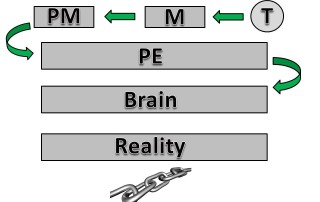Post-Traumatic Stress Disorder Post Traumatic Stress Disorder (PTSD) is diagnosed when an individual displays a cluster of symptoms that include various manifestations of the following: dissociation (feeling removed from reality), re-experiencing (flashbacks), and increased arousal (heightened stress response). In order for a diagnosis of PTSD to occur, however, these symptoms need to be as a result of the individual having been directly exposed to an event that threatened their life and/or safety or that of another individual. This criterion is known as the A1 criterion, since it is the primary criterion that must be present in order for diagnosis to occur. Amongst the general population, 7-8% of people will end up with PTSD at some point in their life. Within certain groups of people, however, such as individuals with substance-use disorders, the rate of diagnosis is much higher. For example, in one sample of substance-abusing psychiatric patients, researchers found that 90% had experienced physical/sexual assault and at least 50% met the diagnostic criteria for crime-related PTSD. However, there is a new direction of understanding with regard to trauma-related stress reactions; it is referred to as complex PTSD (CPTSD). Individuals in this category meet all of the same diagnostic criteria as […]
My approach in a nutshell
A short description of one of the most basic elements of my counselling approach: Educational Relational Behavior Therapy (ERBT) is built around two pillars: psychoeducation and the principles of rational emotive behavior therapy. However, contrary to the concept of irrational beliefs being the main culprit, the individual is not taught to recognize his or her thoughts or beliefs as illogical or irrational, but inaccurate. For example, if an individual believed in their core that the next rainfall would result in a catastrophic flood, the most logical response to the next rainfall would be to get to higher ground as quickly as possible. This would be the best way to avoid getting washed away in the flood. To others, the behavior appears illogical because they do not share the belief of the flood. However, no matter how logical and rational the behavioral response, the fact remains that the premise upon which the logic is based is, in fact, inaccurate. Thus we can say that the response is logical but inaccurate. This may apply to the origins of individuals’ anger, aggression, anxiety, depression, etc. If the individual’s implicit memory of past harms has been triggered by a current situation, then the brain […]
Infidelity in Relationships: Understanding the Grieving Process (Part 1)
Elizabeth Kubler Ross, author of “On Death and Dying” was an instrumental figure in the understanding of the human experience of grief and loss. While her book focused on the grieving process in relation to mortality, the principles she outlined have since been applied to a wide-range of loss experiences. These may include the loss of health, the loss of opportunity, the loss of a job, the loss of a role or responsibility, the loss of identity, and a host of others. The grief and loss that I will be focusing on in this post and the next is the loss of fidelity. In other words, I am referring to the typical and predictable response to infidelity in a relationship. In this first post, I will outline the stages of grief of the Kubler-Ross Model and in the second post, I will apply these principles to the issue of infidelity specifically. By understanding the stages, or forms of grief outlined by Kubler-Ross, individuals may be able to recognize where their experiences be found along the continuum of typical responses to this form of tragedy. The Five Stages of Grief 1. Denial This is a state of emotional shock, wherein the […]
Skate and Learn
As I was approaching my 35th birthday, I happened to be exposed to a few videos on YouTube featuring skateboarders. For some reason, this seemed to stir something within me. When I was younger (much younger), I used to own a skateboard. I hesitate to describe myself as a skater because to me that would imply the possession of some talent when using the skateboard, which I had very little of. That didn’t mean that I didn’t enjoy it though. Looking back on it now, I recognize one of the biggest limitations to my ability to develop any skill was my tendency to quit before I had started, owing to my ADHD, depression, and anxiety. However, now as an adult, with my ADHD more or less under control and the financial ability to be able to purchase a skateboard (why does being a counterculture rebel and sticking it to the man have to be so expensive?), the idea began to grow within my mind that I could get good at it. At first, I felt sheepish to admit that I wanted to start skateboarding at the age of 35 but then I put things in a social and historical context. […]








Recent Comments